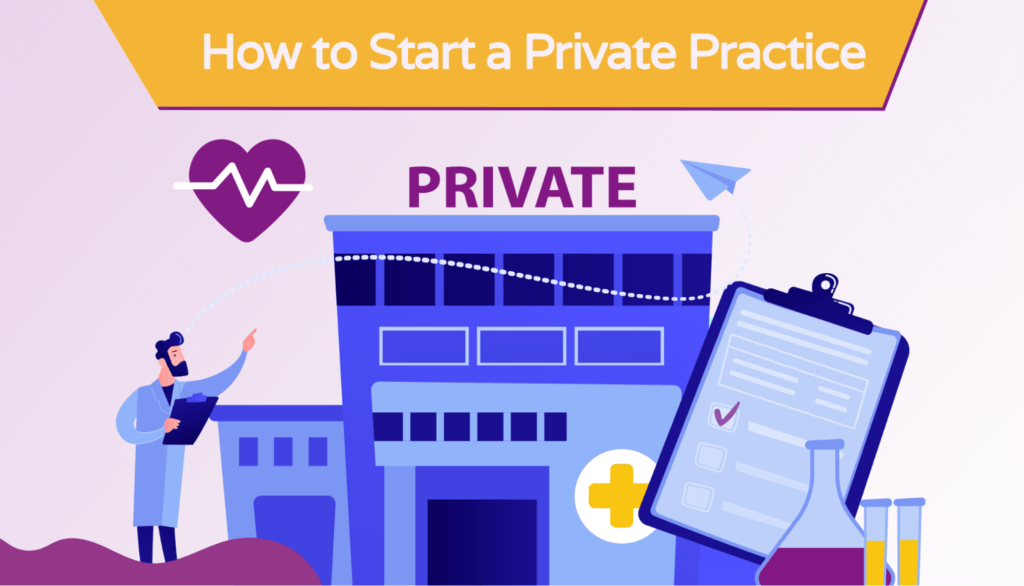In recent years, many physicians are choosing to open a private practice rather than working for a hospital or health center.
Of course, there's a lot to consider when making this decision, from the type of practice you want to open to the location and target market. This often deters physicians from taking the leap.
However, with the right planning and preparation, opening a private practice can be a rewarding, lucrative, and exciting experience.
There are several things to keep in mind when opening a private practice. This article will guide you through the primary steps in the process and provide tips on how to make your practice successful.
What is a private practice?
A private practice is a medical practice that is owned and operated by one or more physicians, rather than affiliated with a hospital or health system. They often provide care for patients who pay out-of-pocket or have their own private insurance.
There are some key differences between a private practice and working for a hospital or health system. First, private practices are usually much smaller than hospitals or health systems. This allows physicians to get to know their patients more personally and develop long-term relationships.
Second, private practices usually focus more on preventive care and wellness than treating severe illness or injury. Most private practices aim to keep patients healthy and out of the hospital. Private practices often have more flexible hours than hospitals or health systems. This can be beneficial for both physicians and patients, as it allows for convenient appointments for both parties.
There are over 1,073,616 physicians in the USA as of 2022, highlighting the wide range of opportunities for those considering opening a private practice.
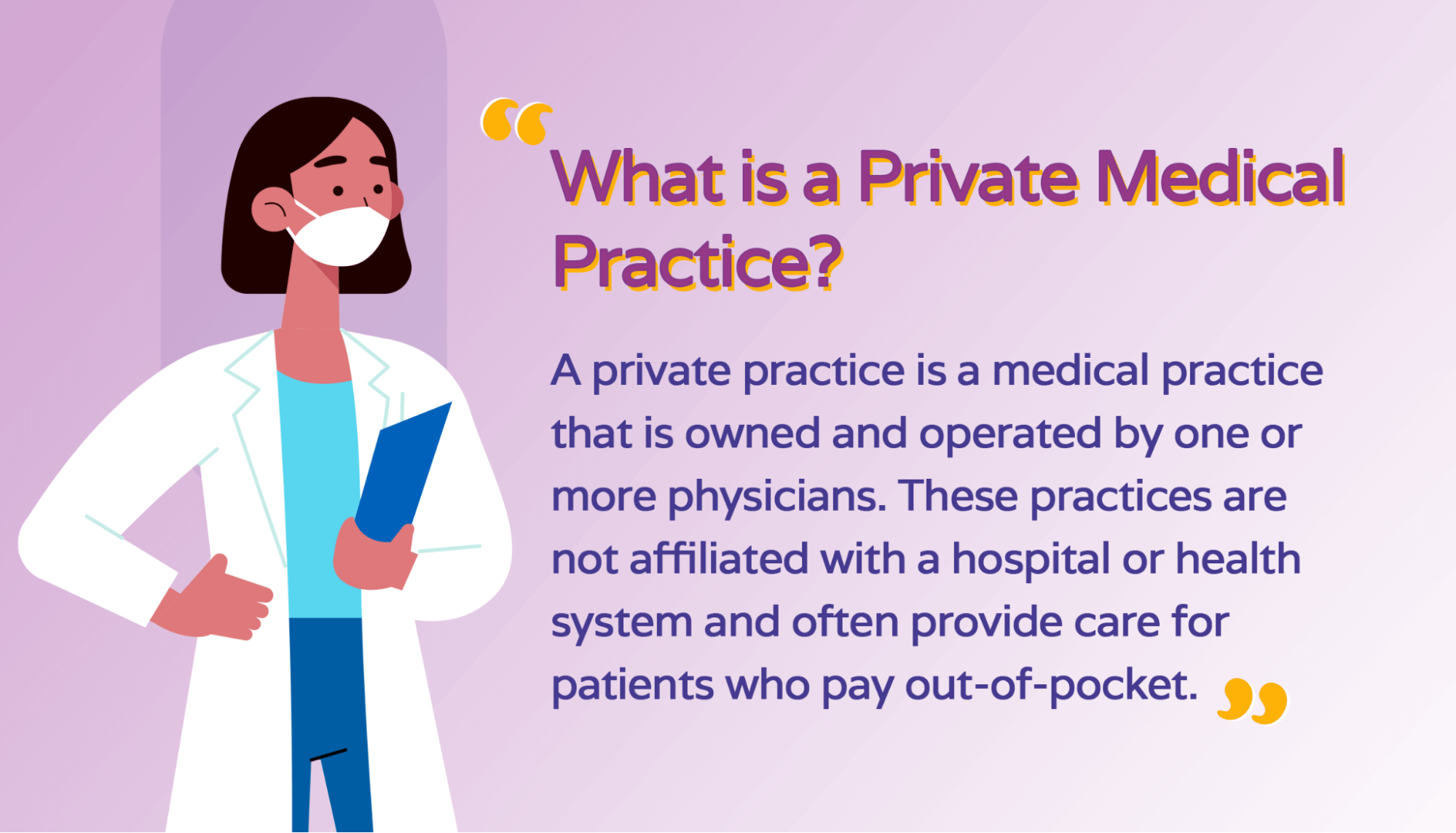
Mainly, starting your own private practice has a lot of advantages. You're your own boss, and you can choose your patient base.
That being said, there are also some challenges to keep in mind. For example, you will likely have higher overhead costs than if you were working for a hospital or health system. You will also be responsible for all aspects of the business, from marketing to billing. Numerous resources are available for private practice owners to help streamline these processes.
Learn how a virtual administrative assistant from Hello Rache can help your new private practice and ease some of the growing pains and challenges you're going to face. Virtual assistants are a cost-effective way to handle many of the business tasks of a private practice, from scheduling appointments to patient check in, billing, and more.
How to start a private practice
If you are ready to take the big leap and start your own private practice, there are some fundamental steps you should take.
Firstly, you need to determine what types of private practice you're going to open. Let's look at each type of private medical practice in more detail.
Solo practice
A solo practice is owned and operated by one physician. This type of practice offers the most control and flexibility, but it can also be the riskiest.
If you are considering a solo practice, it is important to make sure you have a solid business plan in place. Many solo practices are successful, but they require hard work and dedication.
With a solo practice, most of the income (but also the decision-making, liability and workload) falls on the shoulders of the owner.
Partnership
A partnership is similar to a solo practice but is owned and operated by two or more physicians. This type of practice can be less risky than a solo practice, as there is more than one owner.
However, partnerships can be difficult to manage, so it is important to choose your partners carefully. If you are considering a partnership, be sure to have a written agreement that outlines each partner's roles and responsibilities.
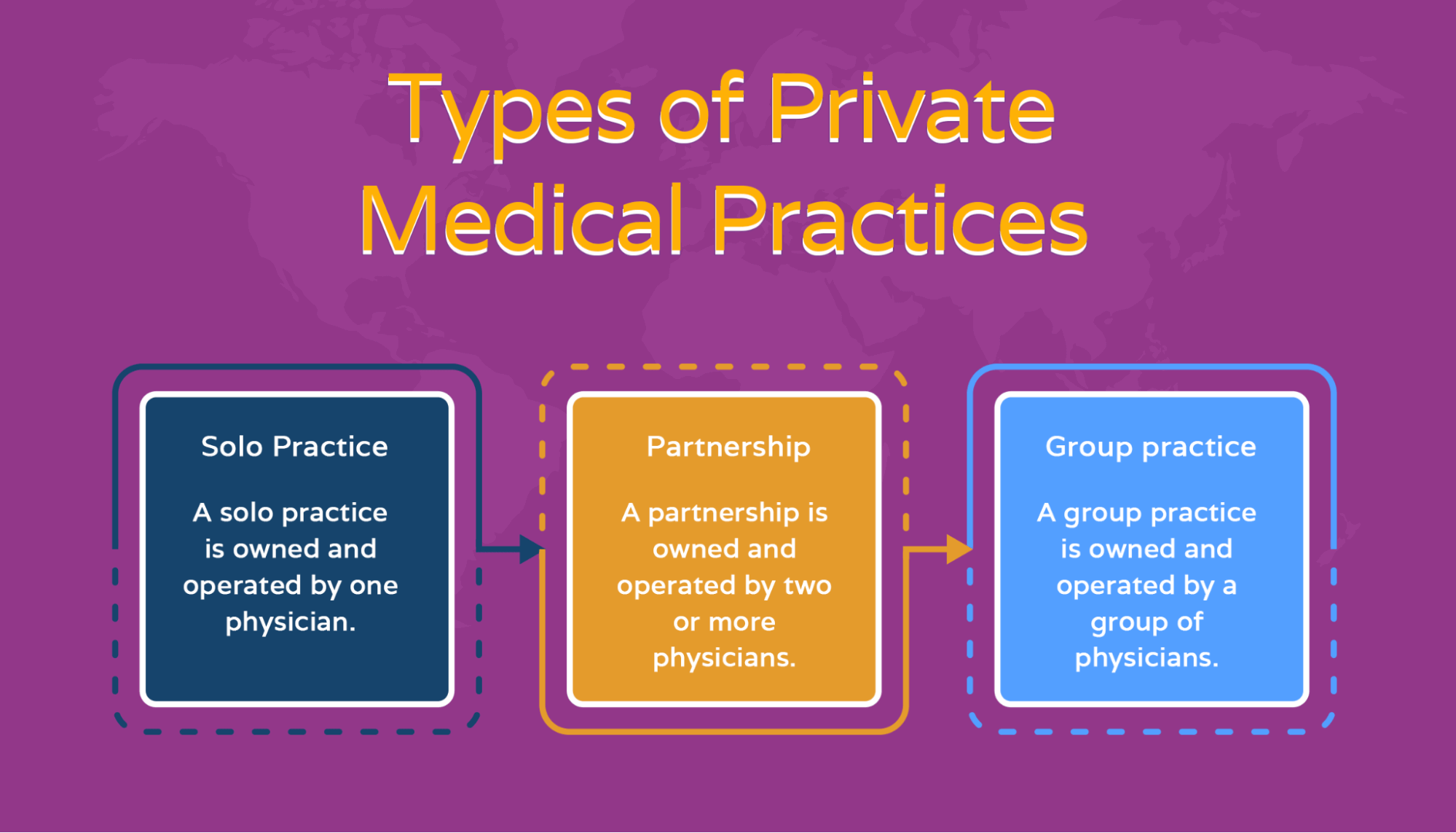
Group practice
A group practice is owned and operated by a group of physicians. This type of practice offers the benefit of economies of scale and the ability to share resources and common expenses. However, group practices can be difficult to manage, and there may be more bureaucracy than in a solo or partnership practice. With all the moving parts, staying true to the group's mission and vision can be challenging. Be sure to take time to carefully select the members of your group and put systems in place to keep everyone on track.
Get the details right
After you decide on the type of practice you want to open, it's time to implement your plans. This means finding the right location, hiring staff, and marketing your practice. We'll take an in-depth look at these next steps below.
1. Create a business plan:
A business plan is a roadmap for your new practice. It should include information on your target market, financial projections, and marketing plan. Creating a business plan will help you raise capital, secure loans, and attract investors. Many find this step to be the most intimidating. However, there are vast resources available to help, including the Small Business Administration (SBA) and the Association of American Medical Colleges (AAMC).
2. Choose a location:
The physical location of your practice is important for both patients and staff. You will want to choose a convenient location for your ideal clients with the amenities your in-house staff needs.
While many private practices employ Healthcare Virtual Assistants from providers like Hello Rache, your physical location is paramount to the success of your unique medical practice.
3. Decide on insurance:
One of the most important decisions you will make is what type of insurance to accept. Roughly 60% of private practice patients have private insurance, meaning it's crucial to weigh the pros and cons of each type of insurance. You will need to consider the type of patients you want to see and the reimbursement rates from each insurance company.
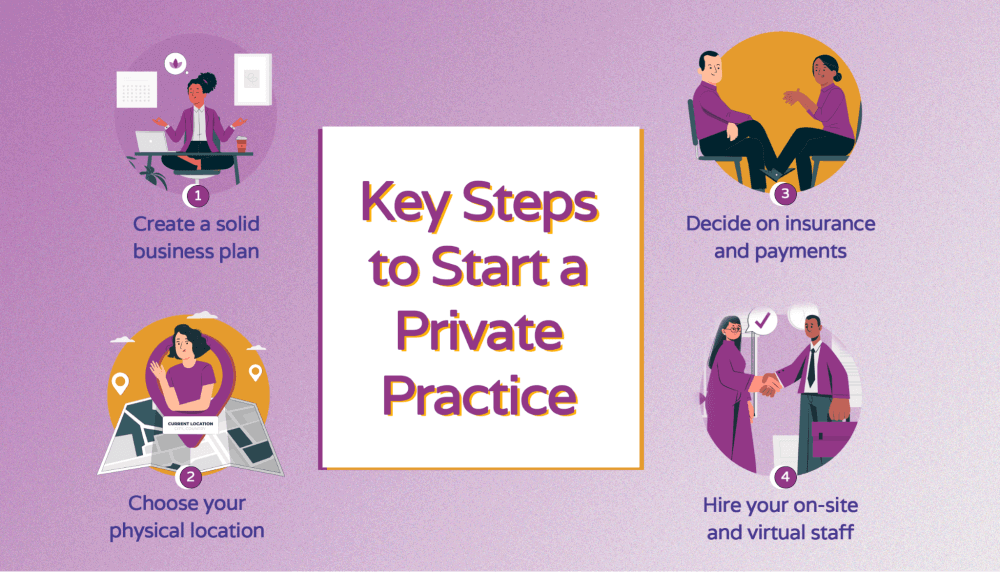
4. Hire staff:
Once you have an office location and insurance lined up, you will need to hire staff. You will need to decide the number of staff members you need and what type of roles they will play in your practice. Virtual staff members from Hello Rache use secure conferencing software like Zoom and a tablet or computer to connect with patients as they check in for appointments, call to schedule, or conduct follow-up visits virtually.
5. Market your practice:
You will need to market your practice to attract patients and refer private practitioners. There are many ways to market a private practice, including advertising, PR, and social media. Having a well-rounded marketing strategy that reaches your target audience is important. Your patient base will grow organically as you provide quality care, but marketing can help you attract new patients more quickly.
These are just a few of the numerous things you need to do to open a successful practice. Creating a business plan, choosing a location, and marketing your practice are essential first steps. Hiring the right staff and deciding on insurance are also important considerations. However, don't forget the little things. Be sure to stock your office with the supplies you need and set up an efficient check-in process by securing virtual front desk services.
Physicians across the country are choosing to open private practices. The number of solo and small group practices is on the rise as more and more physicians seek independence from hospitals and large group practices. If you're thinking about opening a private medical practice, these steps will help you achieve greatness.
Helpful tips and resources
Opening a private practice can seem overwhelming, but there are some things you can do to make the process easier.
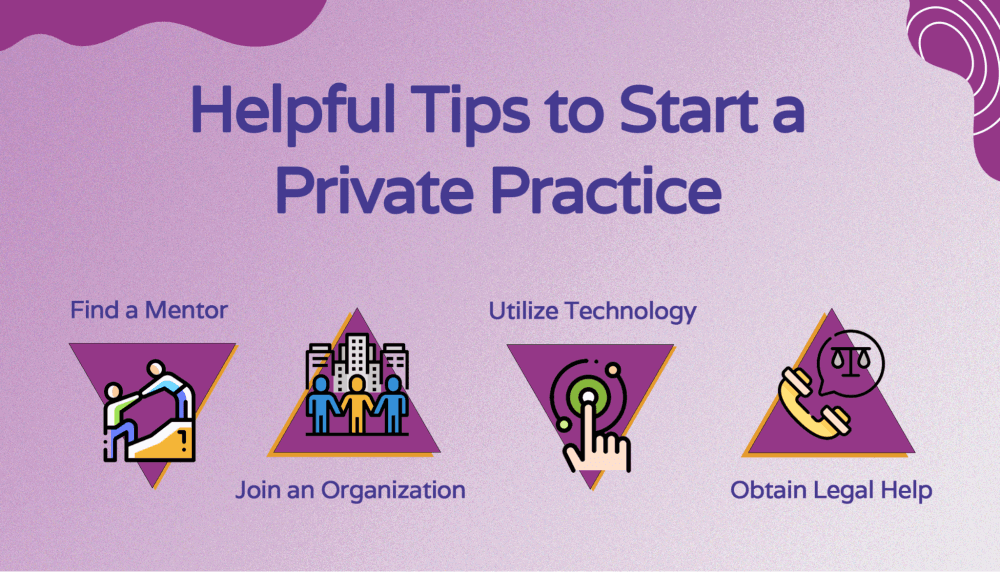
Here are a few useful tips and resources to help you get started.
1. Find a mentor:
Finding someone who has already opened a successful private practice can be an invaluable resource. They can advise and guide everything from choosing a location to marketing your practice. Many overlook this step, but it can be helpful to have someone to bounce ideas off of and answer any questions. You can truly benefit from the experience of someone who has already been through the process.
2. Join a professional organization:
Joining an organization such as the American Academy of Private Physicians (AAPP) can provide you with access to resources, networking opportunities, and educational programs. There are also organizations specific to your state or region that can offer additional support. These organizations' value lies in connecting with other private practice owners who can provide support and advice.
3. Use the latest technology:
Many software programs and online tools can help you manage your practice more efficiently. From patient portals to EHRs, many options are available to help you streamline your operations. Technology can help you save large amounts of time and money while providing better patient care.
4. Get help from a professional:
Hiring a dedicated professional, such as an accountant or attorney, can help you avoid costly mistakes. They can advise you on everything from business structure to employment law. While you may be able to save money by doing some things yourself, there are certain areas where it is worth the investment to get professional help.
The process of opening a private practice can be daunting, but with proper planning and execution, it can be a successful endeavor. These tips and resources can help you get started on the right foot.
Consider using a virtual front desk
Virtual office services can be a great option for your private practice if you're trying to save time and money. A virtual front desk service can provide many of the same functions as a traditional receptionist at a fraction of the cost.
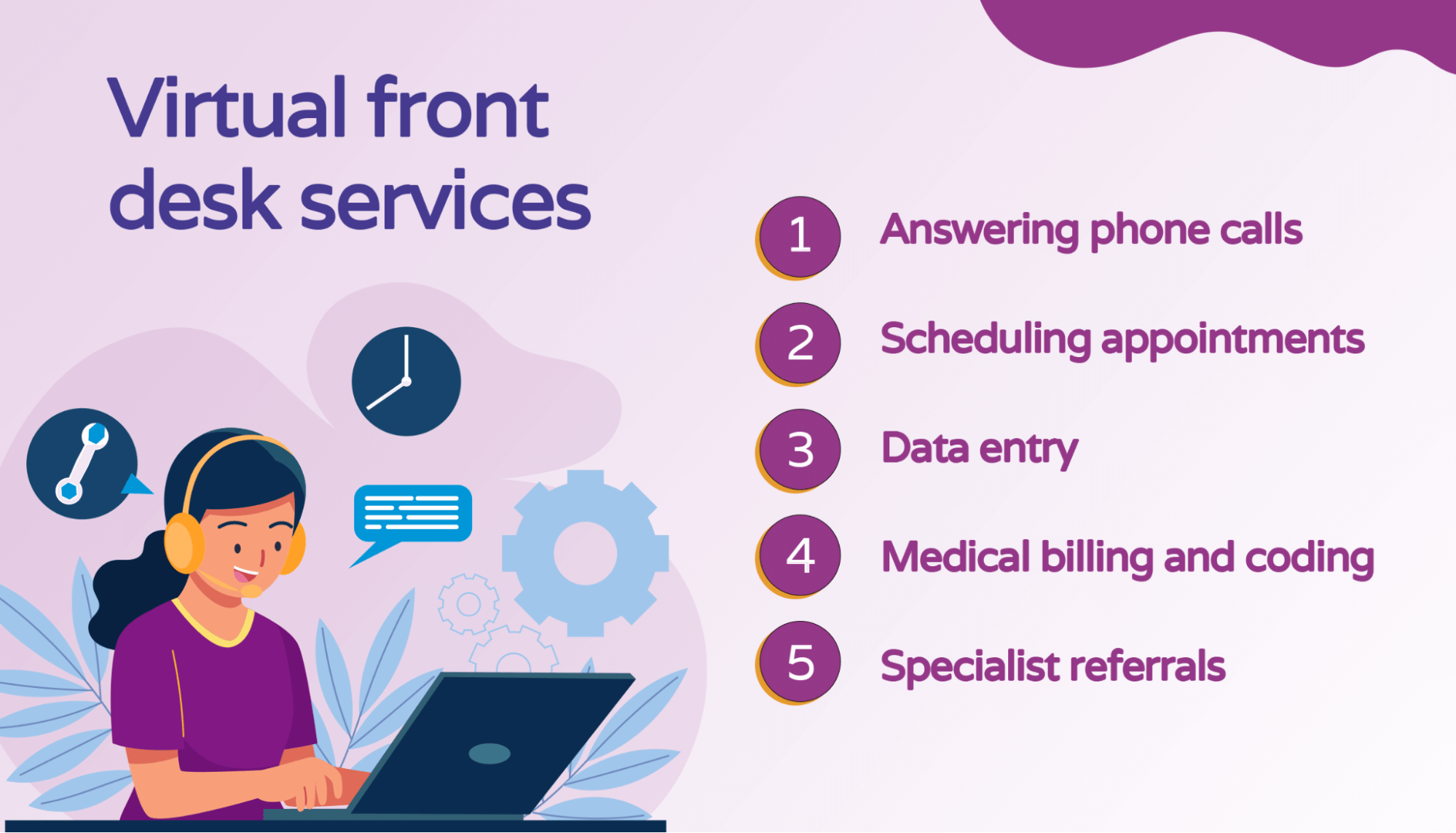
A virtual front desk service can answer phones, schedule appointments, and handle other administrative tasks. This can free up time, allowing you to focus on more important things, such as seeing patients and growing your practice.
Virtual office services can also help you save money on overhead costs. You won't need to lease office space or furnish a reception area. And, you won't have to pay for benefits for a full-time employee.
Let's look at how a Healthcare Virtual Assistant can help your new practice. They can:
- Answer and route all of your calls
- Schedule and confirm all of your appointments
- Collect payments and process insurance claims
- Handle all of your social media accounts
- Send out appointment reminders
A virtual receptionist can connect with your ideal clients over software like Zoom to answer any questions they may have, help them check in for an appointment, or reschedule if needed. Even though these employees do not work in-house, they are still able to be that friendly, recognizable face that patients will come to know and love.
Many physicians are hesitant to outsource these important tasks. However, with the right company, you can find a team of highly-trained professionals who will provide the same level of service as an in-house staff member. Virtual office services should be a top consideration for your new private practice if you're looking for a way to save time and money.
Open your own private practice.
If you're considering starting your own private practice, doing your research first is important. The tips and resources in this article can help get you started on the right foot. Always take the time to plan before taking the plunge into private practice ownership. With the right preparation, you can set your practice up for success.
Contact Hello Rache to learn more about how we can help you open your own private practice. Our team of experts can provide the guidance and support you need to get started with virtual front desk services. You can fully transform the way you do business and free up your time to focus on what's most important — providing quality patient care. Don't let your misconceptions about private practice stop you from achieving your dream of business ownership.

